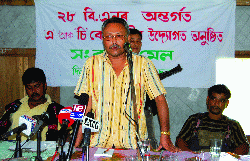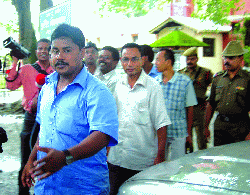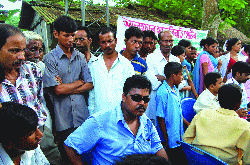Archives
Dwindling ULFA
For long, the Myanmar-based ‘28th battalion’ remained ULFA’s most potent striking force, responsible for a majority of the outfit’s attacks, principally in the eastern-most Districts of the State, generally referred to as ‘Upper Assam’. The ability of this ‘battalion’, divided into three ‘companies’ (Alfa, Bravo and Charlie), to engage in hit and run attacks in these Districts, remained a perennial nuisance for the security forces (SFs). It was, in fact, the military successes of this battalion that helped the outfit restore much of its battered image in the aftermath of the December 2003  military operations in Bhutan. A significant concentration of counter-insurgency operations in the Upper Assam Districts further allowed the ULFA to revive its ‘709th battalion’ in the Districts sharing a border with Bhutan and also to raise a new ‘27th battalion’, comprising of significant number of cadres, in areas including the hilly southern District of Karbi Anglong.
military operations in Bhutan. A significant concentration of counter-insurgency operations in the Upper Assam Districts further allowed the ULFA to revive its ‘709th battalion’ in the Districts sharing a border with Bhutan and also to raise a new ‘27th battalion’, comprising of significant number of cadres, in areas including the hilly southern District of Karbi Anglong.
However, the June 24, 2008, announcement of a unilateral ceasefire by the ‘Alfa’ and ‘Charlie’ companies of the ‘28th battalion’ turned the tide decisively against the group. The decision of these ‘companies’ to announce a ceasefire was precipitated by the serious operational difficulties of movement between Myanmar and Assam, particularly after the November 2007 clashes with the Naga militant outfit, the National Socialist Council of Nagaland – Isak-Muivah (NSCN-IM) and the early 2007 activation of the counter-insurgency grid in Arunachal Pradesh. The Assam Police played a pro-active role in releasing an arrested leader of the ‘28th battalion’, Mrinal Hazarika, on bail to negotiate with the fence-sitting ULFA cadres. Hazarika who had been arrested in 2005 from a Siliguri hotel (in North Bengal) had as sured the Police top brass of his ability to win over his former colleagues. Amidst a local media’s hullabaloo over his ‘disappearance’ after being bailed out, Hazarika, within three days of his release, was able to secure a ceasefire declaration by these two companies.
Loyal lieutenants remained crucial to the top down chain of command between the ULFA’s leadership in Bangladesh and the Myanmar based ‘28th battalion’. However, in the year 2007, SFs in Assam achieved a series of successes in terms of neutralising a number of senior commanders of the outfit, making the ‘battalion’ almost a leaderless formation barely capable of sporadic acts of violence. While commanders like Charan Majhi, Debojit Konwar, Palashmoni Rajbonshi, Ulum Bhuyan and Amar Tanti were killed during separate encounters, others, including Prabal Neog and Dibakar Moran, were arrested, and Ghanakanta Bora surrendered. It was, consequently, not too difficult a task for Mrinal Hazarika, in spite of the fact that he had been behind bars since his 2005 arrest, to woo the surviving low level commanders and win them over. One of the ULFA ‘commander-in-chief’ Paresh Barua’s close confidants, Bijoy Chinese, as well as the Bravo company commander, Sujit Moran, however, distanced themselves from the pro-ceasefire group.
The ULFA chief has since issued threats to these compromising commanders. He is also learnt to have disbanded the companies of the ‘28th battalion’ by merging the ‘Bravo company’ with the remaining cadres of the ‘Charlie company’, who have not joined the pro-ceasefire group, and appointed Bijoy Chinese as the battalion commander. Barua continues to reiterate his old position of negotiating the issue of Assam’s sovereignty with the Government of India and nothing less.
Following the settlement of nearly 100 cadres of the ‘28th battalion’ in two ‘ceasefire’ camps at Champakuan and Digboi in the Tinsukia District, Mrinal Hazarika and his colleagues, including Dibakar Moran and Prabal Neog, who were released from prison in August, and Jiten Dutta, have built up a popular movement for peace in the State in the past two and half months. They have addressed local organisations, held public meetings and road shows, and also issued numerous press statements asking the ULFA top brass to change course. They have even sent relief materials to the flood affected areas like Majuli. Reports have indicated that 14 truckloads of relief material were sent by the 28th battalion to Majuli, where 132 villages have been submerged. All these have attracted large audience across the Upper Assam Districts and have eaten swiftly into the credibility of ULFA’s recalcitrant top leadership, increasingly seen to be stubbornly and irrationally resisting the idea of negotiating with the Government. These ‘rebel’ leaders now plan to unify under a single unit and form a core group of ‘four or five persons’ to start negotiations with the Government, if the top ULFA leadership does not accede to their request to agree to talk peace ‘unconditionally’.
Both the support and the numbers of these new messengers of peace have swelled over the past month. Intelligence reports indicated that even the ‘Bravo Company’ of the 28th battalion, which had earlier refused to join the pro-ceasefire group, is contemplating surrender. More than 100 cadres  comprising this ‘company’ are planning to make a trip from the jungles of the Sagaing Division of Myanmar through either Nagaland or Arunachal Pradesh to Assam, to lay down arms before the SFs. The plans of surrender of this company, however, suffered a setback as a result of the September 12 killing of Sasanka Baruah at Dirok in Tinsukia, which the pro-peace factions described as a fake encounter by the Army personnel. The ‘B’ company then put up a conditionality of dismantling the Unified Command Structure, indirectly meaning withdrawal of the Army from Assam. Both the State and the Union Government have rejected the demand. Some activities of the ‘B’ battalion, especially targeting the tea gardens in the upper Assam districts have since been reported.
comprising this ‘company’ are planning to make a trip from the jungles of the Sagaing Division of Myanmar through either Nagaland or Arunachal Pradesh to Assam, to lay down arms before the SFs. The plans of surrender of this company, however, suffered a setback as a result of the September 12 killing of Sasanka Baruah at Dirok in Tinsukia, which the pro-peace factions described as a fake encounter by the Army personnel. The ‘B’ company then put up a conditionality of dismantling the Unified Command Structure, indirectly meaning withdrawal of the Army from Assam. Both the State and the Union Government have rejected the demand. Some activities of the ‘B’ battalion, especially targeting the tea gardens in the upper Assam districts have since been reported.
The ‘709th battalion’, active in Districts including Nalbari, Baksa, Chirang and Kamrup, and the ‘27th battalion’, operating in the Karbi Anglong District, too has sent feelers expressing its willingness to join the peace process. On August 28, 31 cadres of the ‘709th battalion’ surrendered with arms to the authorities at Rangia in Kamrup Rural District. Authorities believe that, in the coming days, more such surrenders are bound to happen. In the event of the declaration of a ceasefire by the Bravo company, the ‘709th’ and ‘27th battalions’, the ULFA’s active cadre strength would be reduced to less than 100 cadres, principally including those who are unattached to any of the ‘battalions’ and who continue to profess loyalty to the central leadership. With the major top commanders of the outfit removed from the scene, the ability of this small band of militants to carry on the group’s activities would be negligible.
The impact of the tactical neutralisation of the entire ‘28th battalion’ is already reflecting in the diminished ability of the outfit to carry on with its activities. Assam Police records indicate that, in the post-June 24 period (till the first week of September), ULFA’s cadres have been able to carry out only six bomb attacks in the State. Two explosions each took place in the central Nagaon and western Dhubri Districts and one each in the northern Baksa and Chirang Districts. Five persons were injured when ULFA cadres detonated an explosion near Haiborgaon Railway Station in the Nagaon District on June 27. Five persons were killed and over 50 injured in the June 29 explosion in the Baksa District and three persons were injured in another explosion in the Nagaon District on the same day. Between June 25 and September 7, eight ULFA militants have been killed in separate incidents in the Nalbari, Bongaogaon, Goalpara, Sibasagar and Jorhat Districts.
The marginalisation of ULFA has also had its impact on the general level of militant violence in the State. Out of the 194 total fatalities in militancy-related activities in Assam in 2008, of which ULFA used to have a lion’s share, the months of July and August accounted for only 23 deaths. Except for three low intensity explosions in Dhubri and Chirang Districts, of which the one in Dhubri injured two persons, ULFA’s call for boycott of the Independence Day Celebrations on August 15 was peaceful.
Apart from the dwindling cadre strength, what has made a backlash or at least a flutter of reaction on part of the ULFA remnants even more difficult is the ‘management’ of the outfit’s overground organisations, such as the Manab Adhikar Sangram Samiti (MASS) and some of the other individuals considered to be ULFA sympathisers. Organisations like MASS, in spite of their known history of linkages with the militants, had never been taken to task by the authorities in Assam. Taking advantage of this policy, leaders of such outfits not only became parts of ULFA-sponsored groups like the People’s Consultative Group (PCG), to carry forward ULFA’s messages to the masses, but also, in some cases, took active part in sheltering the ULFA militants and on occasions, identifying targets for the militants. On February 10 and 11, 2008, for instance, the Assam  Police, following a statement by an arrested ULFA cadre, arrested Lachit Bordoloi, adviser to MASS, advocate Nekibur Zaman and television journalist Pradeep Gogoi, on charges of aiding ULFA’s plans to hijack an aeroplane from the Guwahati Airport. On June 21, Hiranya Saikia, a PCG member, was arrested on charges of colluding with the outfit. Although all these persons have been since released on bail, these arrests did send a strong signal to ULFA’s over-ground workers and clearly acted as a dampener to any possibility of an organised reaction to the latest peace initiatives.
Police, following a statement by an arrested ULFA cadre, arrested Lachit Bordoloi, adviser to MASS, advocate Nekibur Zaman and television journalist Pradeep Gogoi, on charges of aiding ULFA’s plans to hijack an aeroplane from the Guwahati Airport. On June 21, Hiranya Saikia, a PCG member, was arrested on charges of colluding with the outfit. Although all these persons have been since released on bail, these arrests did send a strong signal to ULFA’s over-ground workers and clearly acted as a dampener to any possibility of an organised reaction to the latest peace initiatives.
ULFA’s complete silence on the ongoing agitation on the illegal migrants from Bangladesh has, moreover, further alienated the people of Assam from the outfit. ULFA continues to insist that not Bangladeshis, but the Hindi-speaking migrants (Indian nationals from other parts of the country) are the real source of the threat to Assam. The perpetration of nearly three decades of directionless violence and a refusal to address issues that concern the people of Assam have deprived the organisation of the popular resonances that its activities once elicited.
It might still be too early to start writing the obituaries on ULFA, though developments over the past two and half months are certainly a near-fatal setback to its existence. Paresh Barua is expected to apply his near three-decade-long experience in running an insurgency to the task of staying afloat. But, given the circumstances and the enormity of the opposition he has created against himself, this will be far from easy, even from the security of his safe-havens in Bangladesh.

